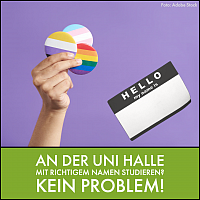Namens- und Personenstandsänderung an der MLU
Overview
Possibilities for official change
Many people whose gender identity does not match or only partially matches the gender they were assigned at birth seek to change their name and gender entry so that it better reflects their identity. There are currently various options in Germany for people who wish to have their name and/or civil status officially changed:
- Submitting an application in accordance with the Act on Self-Determination with Regard to Gender Registration (SBGG) : The Self-Determination Act has replaced the Transsexuals Act. The Federal Government presented a corresponding draft bill in August 2023, which was passed by the German Bundestag in April 2024. The law came into force on November 1, 2024. Comprehensive information on how to apply can be found on the information page ‘SBGG.Info’.
- Application to the name change authority of the city in accordance with the Act on the Change of Surnames and First Names (NamÄndG) (change of first name, but not of marital status; an ‘important reason’ for the change must be presented (e.g. a non-binary gender identity may be recognised as an important reason under certain circumstances); costs are to be borne by the applicant and are calculated according to income and the effort involved in implementation - in the city of Halle, costs range from €5 to €275 .
Possibilities for students at MLU

Since 2019, students can have their name and personal status changed at MLU before an official name and personal status change has been completed. Until now, the prerequisite for this was that the application for a name change had already been submitted to the relevant local court. In July 2023, the Rectorate decided to make things even easier: name and personal status changes are possible on the basis of a self-disclosure (including a notification of the identity card number). Once a change has been made, a blocking period of one year applies for a new application.
The data will be fully adjusted in the database so that in the future, for example, student ID, e-mail address, study certificates, Stud.ip and transcripts will reflect the self-selected name and personal status.
To change your name and personal status, a corresponding form is available at the Student Service Center.
Please note the following things, which are also pointed out to you in the application form:
- A one-time fee of 10.30 euros is due for the issuance of the new student ID card.
- After the change has been made, a blocking period of one year applies for a new application at MLU.
- All documents issued by MLU will be issued with the new data. It is no longer possible to issue them in the old name.
- There may be problems with non-university offices where you are still registered with your official name if you present documents issued by MLU in your new name (e.g. a certificate of enrolment to your health insurance company). There is a special feature with the Deutschlandsemesterticket: although the digital ticket in your smartphone or on a chip card shows your new first name, an official photo ID (usually an identity card) must always be shown when checking your entitlement to travel. To avoid problems because it still shows the old name, HAVAG offers the option of changing the first name back in the digital ticket at the Escalator Service Center. Further information can be found on the HAVAG website .
You are responsible for any problems and claims, not the university. In such cases, the use of a dgti supplementary ticket can be useful. The Enrolment Office can issue a certificate confirming the name change. However, this cannot be used for the Deutschlandsemesterticket. Whether it will be accepted by other authorities cannot be guaranteed either. - If you also wish to update your photo on your student ID card, it is advisable to enclose the new photo and the request for the change with the application.
Possibilities for employees at MLU
MLU employees can use their desired name and civil status on the basis of the dgti supplementary ID card at MLU in digital systems relevant to everyday university life (e-mail address, Stud.ip, Löwenportal, library system, communication directory, etc.), regardless of any official change. The desired name and civil status can also be used on university websites.
For legal reasons, a full adjustment is unfortunately not possible without an official change, which is why the change does not affect employment contracts, social security and salary matters, and the personnel card.
The university is also endeavoring to incorporate the desired form of address and pronouns in its communications. For technical reasons, this is unfortunately not yet fully possible at present and will be implemented wherever it is already possible. A comprehensive consideration will be strived for in perspective.
A corresponding application form for the change of name and civil status will soon be available to the Human Resources department (Abteilung 3 – Personal).
Please note:
The associated procedure and application form have already been finalized. Unfortunately, however, there is a delay in implementation due to technical difficulties. We are working on a solution and will inform you here as soon as the procedure can be used. You are welcome to contact the Prevention and Counselling Office for Anti-Discrimination in this regard.
What is a dgti-supplement ID and how to get it?
As long as the personal status of TIN students is not officially changed yet, there is a discrepancy between the gender identity and the official documents such as the identity card. This leads to disarray, difficulties and problems with everyday situations, if people have to identify themselves.
The dgti supplement ID includes all self-chosen personal data, as well as a current passport photo, so that there is no mismatch remaining between the official papers and the individual. Its trilingualism in German, English and French enables the usage for international travel as well. Reports on the supplement ID have been for the most part very positive. The usual need to provide explanation, which comes together with disarrays, ends. A QR-Code on the ID leads to a text on the website of the dgti and provides authorities and other institutions with information on the function of the supplement ID and thereby increases its practicability. Depending on your needs, the aforementioned text can also be printed and taken along. All interior ministries, the federal ministry, as well as various other German authorities, ministries, organizations and associations are aware of the dgti supplement ID.
You can apply online for the ID. A current passport photo and a completed application form are necessary. Furthermore, a service fee in the amount of 19,90€ must be paid. the processing time takes about 4-6 weeks. You can find additional information on the website of the dgti .
Study with the gender status "divers"
The application portal for prospective students provides the option to select "diverse" for gender. No proof of this entry is required for enrollment; this is to be handled in the same way as for male and female students, who also do not have to prove their gender. Gradually, all documents - from the information sheet to the degree certificate - are to become gender-neutral, in which the form of address "Mr. / Ms." is to be dispensed with.
Advice and support in case of problems
If you are a student or employee and have problems related to your name and personal status change at the MLU or other problems or questions regarding your trans*, inter* or non binary gender identity, you can contact the Anti-Discrimination Prevention and Counseling Center confidentially.
Contact
Martin-Luther-Universität Halle-Wittenberg
Stabsstelle Vielfalt und Chancengleichheit
Präventions- und Beratungsstelle Antidiskriminierung
Sabine Wöller
room 303, 3. OG
Dachritzstraße 12
06108 Halle (Saale)
phone: 0345-55 21013
antidiskriminierung@uni-halle.de





